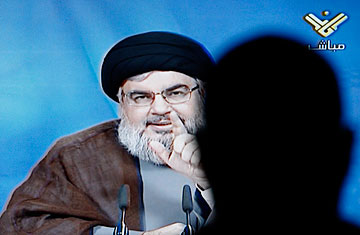
A man listens to Hizballah leader Sayyed Hassan Nasrallah speaking on television at a shop in the port city of Sidon, southern Lebanon, July 2, 2011.
Sheikh Hassan Nasrallah, the leader of the militant Shi'ite Hizballah, vowed Saturday that members of his organization indicted last week for assassinating a former Lebanese prime minister would never be turned over to an international tribunal.
In a 75-minute televised address in Beirut, Nasrallah attacked the credibility of the Netherlands-based Special Tribunal for Lebanon, using video footage to back his claims that it is biased against Hizballah and serving the interests of the United States and Israel.
"We know that it is impossible to annul the tribunal because this is an American project anyway," he said. "It's goal is to tarnish the image of the Resistance [Hizballah] and even to create civil strife in Lebanon."
Nasrallah's comments were the first formal reaction by a Hizballah official to the indictments handed on Thursday to the Lebanese authorities in connection with the assassination in February 2005 of Rafik Hariri, a former Lebanese premier who died in a massive truck bomb blast.
Nasrallah said that even if the newly formed Lebanese government (dominated by Hizballah and its political allies) was led by the opposition, "it will not be able to carry out the warrants and arrest the indicted people. I don't think that they will be able to arrest [them] in... 60 years."
The threat posed by the tribunal to Hizballah has little to do with the judicial process of arrest, trial and conviction — the four people named on the indictment are unlikely ever to be caught and transported to The Hague. But the notion that the Shi'ite Hizballah was involved in the assassination of an iconic Sunni statesman risks dealing a severe blow to the party's carefully-cultivated image in Lebanon and across the Arab and Islamic worlds as a resistance force championing intra-Muslim unity against Israeli occupation and aggression.
His address was peppered with slick video montages, allegedly tying tribunal officials to Western intelligence agencies or demonstrating that they were close to Israel. One of the clips featured Robert Baer, TIME's intelligence analyst and a former CIA officer who operated in Beirut in the 1980s, who it claimed worked with the tribunal.
Baer confirmed to TIME.com that he had previously served as a consultant to the tribunal, but denied he had any continuing professional connections to the CIA and was confident that various US intelligence agencies had not cooperated "on an operational level" with the tribunal.
"The CIA, for a fact, was not helping the tribunal. I know that," he told TIME.com. "The Department of Justice, the FBI and the CIA steadfastly refused to give any information [to the tribunal] on Mustafa Badreddine and all those other guys... they have been very wary about the tribunal's case."
Another video clip apparently filmed by a hidden camera, showed Gerhard Lehmann, deputy to Detlev Mehlis, the first UN chief investigator in the Hariri case, receiving and riffling through a wad of bank notes.
"Lehmann has ties to the Israelis and got paid in return for selling certain reports pertaining to the murder probe," a voice-over said.
The issuing of the long-awaited indictments has raised concerns of sectarian strife in Lebanon, particularly as relations between Sunnis and Shi'ites have been strained in recent years.
But Nasrallah assured that the government would ensure that calm prevails. "To the Lebanese people, who are hearing reports that there might be strife or war in Lebanon, I would like to say that there will be no conflict between the Lebanese, especially between the Sunnis and the Shia," he said.
The detail and effort that went into Nasrallah's presentation suggested it was prepared long in advance of the indictments in expectation that Hizballah members would be accused.
Syria was the prime suspect in Hariri's truck bomb assassination in February 2005 and the focus of the initial stages of investigation. Damascus has always claimed innocence. But when news leaked in May 2009 that the investigation had swung from Syria toward Hizballah, the shock in Lebanon was palpable. For months, the subject was almost taboo in the Lebanese media and few politicians were willing to comment on the allegations in public.
Then in late March last year, Hizballah seized the bull by the horns and launched a deft propaganda campaign that played out over the following months to discredit the tribunal as an impartial judicial body.
